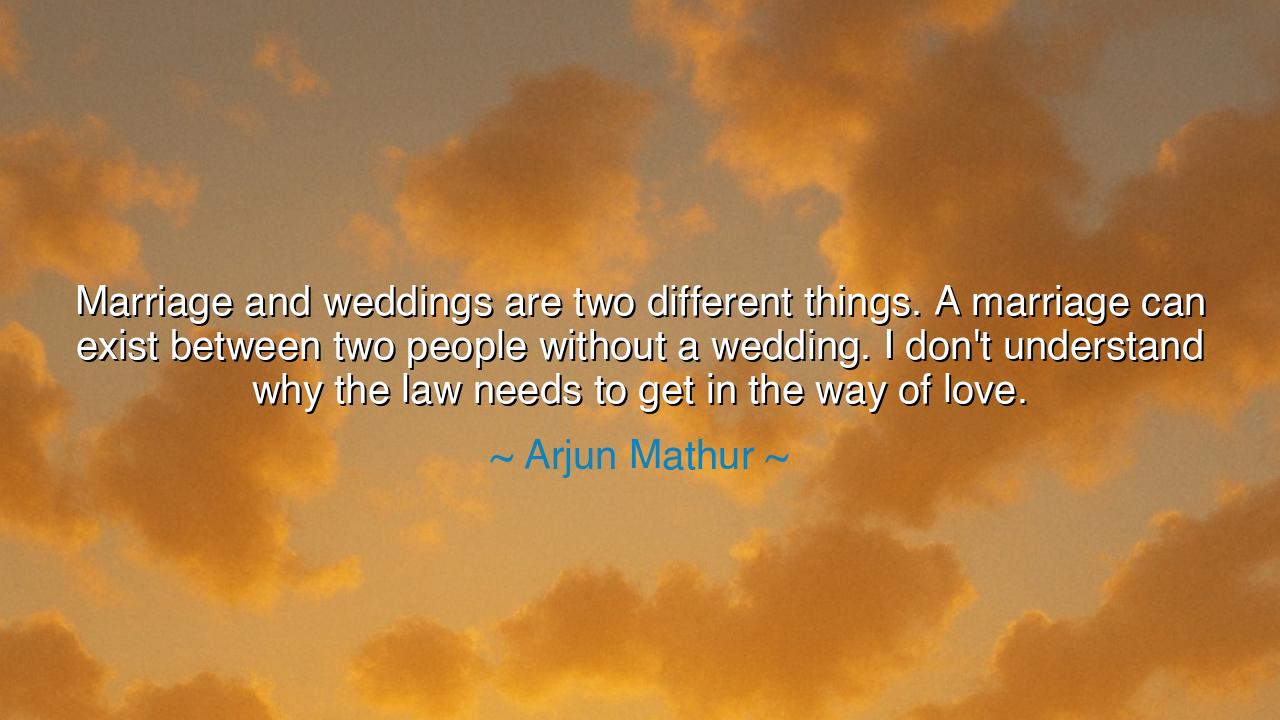
Marriage and weddings are two different things. A marriage can
Marriage and weddings are two different things. A marriage can exist between two people without a wedding. I don't understand why the law needs to get in the way of love.






Arjun Mathur, with words both bold and tender, declared: “Marriage and weddings are two different things. A marriage can exist between two people without a wedding. I don’t understand why the law needs to get in the way of love.” In this statement, he rends apart the veil of custom to reveal the essence of union: that marriage is not in feasts, rituals, or signatures, but in the living bond between two hearts. Weddings may be adorned with music and gold, but it is love that gives true permanence.
The ancients, too, understood this truth. In many tribes and peoples, two souls who pledged loyalty and devotion to each other were bound in spirit, even before the eye of priest or magistrate. Ceremony gave recognition, but marriage was already alive, born in trust, sacrifice, and shared destiny. Mathur’s words are a call to remember that the bond of the heart surpasses the bond of the law.
History bears witness in the story of Anton Chekhov and Olga Knipper, who lived much of their union apart due to duty and circumstance. Their letters, brimming with devotion, carried the weight of a true marriage, though absence and illness kept them distant. They did not require endless ceremony to sanctify their bond; their love was the altar, their loyalty the vow. As Mathur teaches, marriage is not a spectacle, but a covenant of souls.
His words also strike against injustice. For too often, law has stood as a barrier, denying to some the right to call their union a marriage, declaring unworthy what love itself had already sanctified. Mathur challenges this, declaring that love is beyond the reach of courts or kings, and no decree can erase the truth of two hearts joined. The law, meant to protect, becomes unjust when it dares to dictate where love may or may not flourish.
Let the generations remember: a wedding is but a day, yet marriage is a lifetime. Do not confuse the two, nor let the trappings of custom or the chains of law obscure the deeper truth. Where there is loyalty, devotion, and unshakable love, there is already marriage — eternal, indestructible, and beyond the reach of human decree. Thus Mathur’s wisdom stands as both defiance and inspiration: that the heart alone is sovereign in the realm of love.






ANAnh Nguyen
Arjun brings up an important point. Marriage can exist as a deep emotional connection between two people, but the law tends to impose its own conditions, often making it seem like love isn’t real unless it’s legally recognized. But what about couples who choose not to get married but still live fulfilling lives together? Do they deserve the same respect and rights as married couples? Is the law reinforcing an outdated system?
PTKim Hien Phan Thi
This quote is a powerful reminder that love is a deeply personal experience, not something that should be controlled or defined by laws. But it does make me question – is the need for a wedding just about tradition, or does it serve a deeper purpose in society? Why does the law often intervene in defining love, and should we strive for a world where people can define their relationships without legal interference?
PDPhi Dong
Arjun’s point here is so valid. Why do we need legal validation to prove the legitimacy of a relationship? Love, at its core, doesn’t need permission or documentation from the government. But I also wonder – can we really divorce love from society’s need for recognition? Would love flourish without the structure that marriage provides, or would the absence of legal acknowledgment complicate matters for couples in the long run?
TLTràn Thị Thảo Linh
I find this perspective refreshing, as it separates the idea of love from the institutionalized nature of marriage. It raises the question: why do we attach so much significance to a wedding or legal contract when relationships can be just as real without them? What would happen if the law recognized the love between people without the need for official documentation? Is love really validated by a ceremony or a piece of paper?
NPKieu Diem Nguyen Phuong
This quote really challenges the idea of what a marriage should be. In a way, I agree with Arjun – love doesn’t need a wedding or legal paperwork to exist. But is the law's role in marriage a reflection of society’s values, or is it just a formality? Should love be validated by the state, or should it simply exist as it does, regardless of legal status? Can we truly separate love from law?